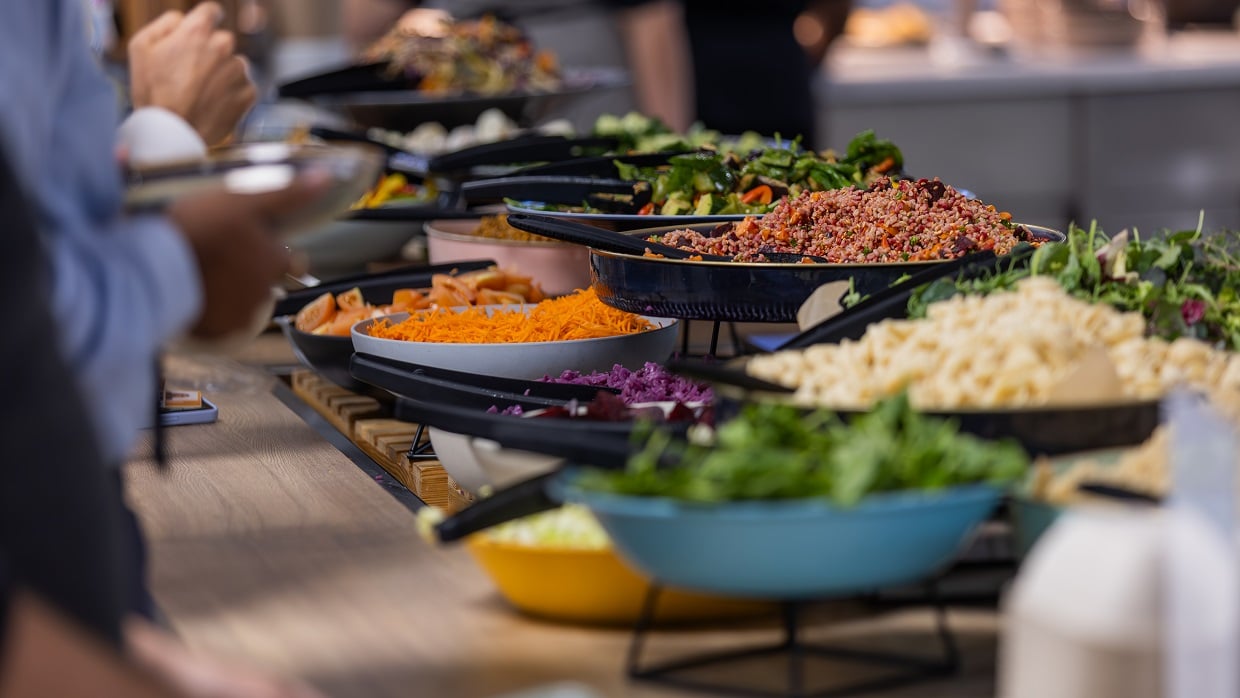New Sodexo research reveals UK consumers value sustainable food, but barriers still remain

Sodexo UK & Ireland has released the results of its second annual Sustainable Food Barometer, showing that UK consumers want nutritious, sustainable meals that protect the planet without compromising on taste or affordability.
This presents a significant opportunity for foodservice providers, manufacturers, and retailers to take the lead in making sustainable eating both accessible and appealing.
The three key takeaways from the research:
First takeaway: consumers still value sustainable food, despite challenges
- 68% of consumers still view sustainable food positively, which is similar to last year’s 69%.
- Price remains a concern but has slightly decreased since last year, with 31% prioritising affordability when buying food compared to 36% the previous year.
- Only 4% cited environmental concerns as their primary consideration, consistent with last year’s findings.
- Sustainable food is seen as healthier and better for the planet, with 35% associating it with better nutrition and 55% linking it to protecting the environment.
What does this mean? In a time when food prices are high and social responsibility matters, UK consumers feel a mix of emotions about sustainable food. They’re mostly positive but still have some doubts. It’s crucial that foodservice providers, manufacturers, and retailers show them that sustainable food is healthy, good for the planet. Without greater uptake from consumers, meeting net-zero targets will be a challenge.
Second takeaway: price, taste, and health are deal-breakers for most consumers
- This year’s Barometer identifies three main consumer profiles when it comes to sustainable food:
the ‘Committed’ (34%), those who choose sustainable food when available.
the ‘Undecided’ (45%), those who hesitate to choose sustainable food products.
the ‘Distant’ (21%), those who have no intention of eating more sustainable products.
- Across all three profiles, the same three priorities stand out: price, taste, and nutrition.
- After price, the top considerations for UK consumers when purchasing food are taste (69%); health factors such as nutritional value (50%) and ingredients (44%).
- The risk of losing taste and flavour is the main barrier for consumers. This is true of 49% of respondents who are ‘Committed’ to sustainable food and 74% of the ‘Undecideds’. Three-quarters of those identified as ‘Distant’ are not willing to consume a sustainable product if it is less tasty than a regular product.
- The price barrier is also significant. While 63% of those in the ‘Committed’ group are willing to choose a sustainable product even if it is more expensive, this drops significantly to just 36% of the ‘Undecided’ and 33% of ‘Distant’ consumers.
What does this mean? UK consumers care about sustainability, but only if it aligns with their expectations for price, taste, and nutrition. Offering nutritious, sustainable food not only meets these demands but also supports healthier lifestyles and a greener planet. Foodservice providers, manufacturers and retailers must offer sustainable meals that are delicious, nutritious, and comparably priced to traditional options to drive meaningful change.
Third key takeaway: food service providers play a big role in driving change
- Consumers see foodservice providers as important players in encouraging sustainable eating (26%), third only to farmers (39%) and agri-food stakeholders (30%).
- Consumers expect foodservice providers to prioritise the following:
Reduce food waste (48%)
Prioritise local sourcing (39%)
Use environmentally friendly ingredients (37%)
Transparency in labelling and certification (34%
Offer creative, delicious recipes (32%)
Educate them about sustainable eating (31%)
- On the matter of low carbon meals, there is a gap between consumer expectations and their current experience:
41% expect restaurants and food-to-go outlets to offer clear carbon labelling, yet 53% of respondents said they did not recall seeing such labels.
While 36% are willing to pay a premium for low-carbon meals, better communication and clearer labelling are essential to encourage adoption.
What does this mean? Foodservice providers must lead by example—not only by offering affordable, delicious, and sustainable meals but also by effectively communicating their value to consumers through clear labelling and taking action on issues such as reducing food waste and prioritising sustainable, locally sourced ingredients.
This research gives us valuable insight into what consumers really want when it comes to sustainable food. They care about the planet but don’t want to compromise on price, taste, or nutrition—and nor should they have to. At Sodexo, we are committed to making sustainable eating the easy choice. We’re committed to serving 70% low-carbon meals by 2030 and cutting our food waste in half by August 2025. To make a difference, we ensure our sustainable meals are affordable, tasty, and accessible for everyone.
As a global leader in sustainable food, Sodexo recognises its responsibility to influence dietary choices that drive a more sustainable future.
In 2024, the company pledged that by 2030, 70% of its main dishes across UK and Ireland sites will be classified as low-carbon, with a target carbon footprint of just 0.9 kg CO2e - well below today’s average of 2–2.5 kg CO2e. Additionally, Sodexo has committed to cutting food waste by 50% by 2025.
In November 2024, Sodexo UK & Ireland chef Adam Collison showcased Sodexo’s commitment to sustainability by winning the 2024 Sodexo Cook for Change! global competition. His plant-based dish impressed fellow chefs, including Michelin-starred chefs, demonstrating how sustainable food can balance taste, creativity, and environmental responsibility.
Find out more about our sustainable diets and low carbon meals